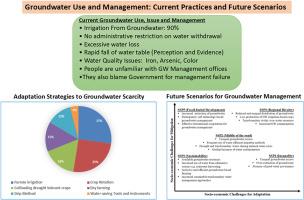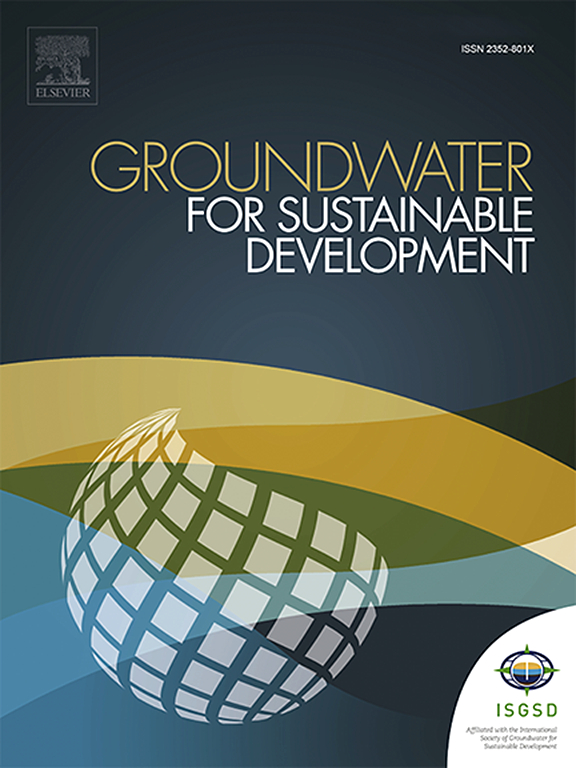Navigating groundwater management in the lower Ganges Basin: A participatory transdisciplinary approach to addressing water scarcity
IF 4.9
Q2 ENGINEERING, ENVIRONMENTAL
引用次数: 0
Abstract
Groundwater (GW) resources in the lower Ganges Basin, Bangladesh, one of the world's largest river basins, are under increasing strain due to rapid depletion and climate change. This study aims to understand people's perception of GW conditions, governance, management practice, and adaptive strategies in response to water scarcity in this region. Using a novel transdisciplinary framework that encompasses system, target, and transformation knowledge within the Shared Socioeconomic Pathways (SSPs) framework, we conducted 150 household surveys and four focus group discussions across six villages in the lower Ganges Basin, engaging marginal farmers, farm owners, and other local stakeholders with practical knowledge of water management. The study reports high reliance on deep tube wells and identifies irrigation-driven overuse as a key contributor to declining water tables. To address these challenges, stakeholders proposed exploring alternative water sources such as rainwater harvesting, recycled water, and reuse. They also criticized the current lack of effective policies, institutional support, monitoring, and collaboration for sustainable GW management. In contrast, farmers are employing various adaptive techniques, such as furrow irrigation, crop rotation, drought-tolerant crops, and dry farming practices, to mitigate water scarcity, with methods tailored to local environmental conditions. According to participants, community-based water management committees and institutional training are pivotal for the successful implementation of these techniques. The study conceptualizes future scenarios for GW management based on shared socioeconomic pathways (SSP), integrating insights from surveys and FGDs. These scenarios encompass qualitative aspects of farming strategies, alternative water sources, management scales, and governance frameworks. By integrating SSPs with a transdisciplinary framework, this novel study offers insights into participatory, adaptive and sustainable GW management for the lower Ganges Basin and other regions with similar water challenges.

在恒河流域下游导航地下水管理:解决水资源短缺的参与式跨学科方法
作为世界上最大的河流之一,孟加拉国恒河流域下游的地下水资源由于迅速枯竭和气候变化而面临越来越大的压力。本研究旨在了解人们对该地区GW条件、治理、管理实践以及应对水资源短缺的适应性策略的看法。在共享社会经济路径(ssp)框架下,我们采用了一个包含系统、目标和转型知识的新型跨学科框架,在恒河下游的6个村庄进行了150次家庭调查和4次焦点小组讨论,让边缘农民、农场主和其他具有水管理实践知识的当地利益相关者参与其中。该研究报告了对深管井的高度依赖,并指出灌溉驱动的过度使用是导致地下水位下降的一个关键因素。为了应对这些挑战,利益相关者建议探索替代水源,如雨水收集、循环水和再利用。他们还批评目前缺乏有效的政策、机构支持、监测和合作,以实现可持续的GW管理。相比之下,农民正在采用各种适应性技术,如沟灌、轮作、耐旱作物和旱作耕作,以适应当地环境条件的方法缓解水资源短缺。据与会者说,以社区为基础的水管理委员会和机构培训是成功实施这些技术的关键。该研究基于共享社会经济路径(SSP),结合调查和fgd的见解,对GW管理的未来情景进行了概念化。这些情景包括农业战略、替代水源、管理规模和治理框架的质量方面。通过将ssp与跨学科框架相结合,这项新研究为恒河下游流域和其他面临类似水资源挑战的地区的参与性、适应性和可持续GW管理提供了见解。
本文章由计算机程序翻译,如有差异,请以英文原文为准。
求助全文
约1分钟内获得全文
求助全文
来源期刊

Groundwater for Sustainable Development
Social Sciences-Geography, Planning and Development
CiteScore
11.50
自引率
10.20%
发文量
152
期刊介绍:
Groundwater for Sustainable Development is directed to different stakeholders and professionals, including government and non-governmental organizations, international funding agencies, universities, public water institutions, public health and other public/private sector professionals, and other relevant institutions. It is aimed at professionals, academics and students in the fields of disciplines such as: groundwater and its connection to surface hydrology and environment, soil sciences, engineering, ecology, microbiology, atmospheric sciences, analytical chemistry, hydro-engineering, water technology, environmental ethics, economics, public health, policy, as well as social sciences, legal disciplines, or any other area connected with water issues. The objectives of this journal are to facilitate: • The improvement of effective and sustainable management of water resources across the globe. • The improvement of human access to groundwater resources in adequate quantity and good quality. • The meeting of the increasing demand for drinking and irrigation water needed for food security to contribute to a social and economically sound human development. • The creation of a global inter- and multidisciplinary platform and forum to improve our understanding of groundwater resources and to advocate their effective and sustainable management and protection against contamination. • Interdisciplinary information exchange and to stimulate scientific research in the fields of groundwater related sciences and social and health sciences required to achieve the United Nations Millennium Development Goals for sustainable development.
 求助内容:
求助内容: 应助结果提醒方式:
应助结果提醒方式:


